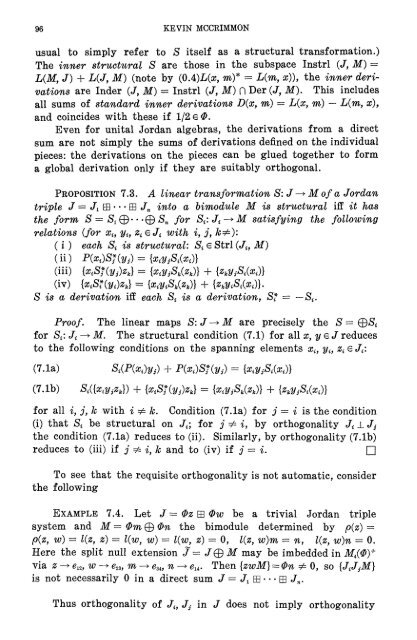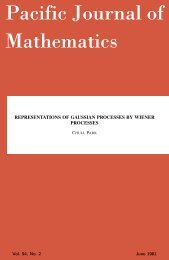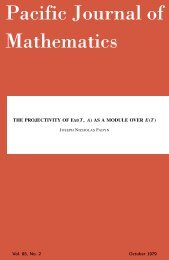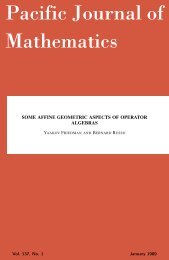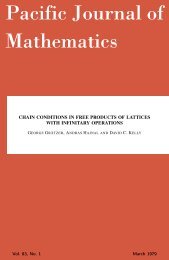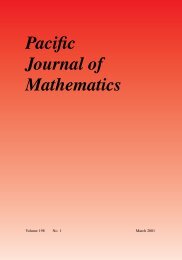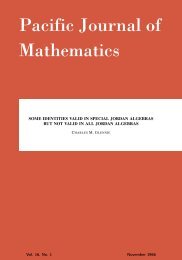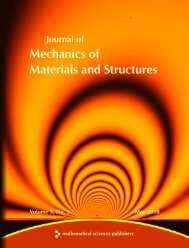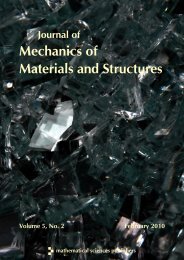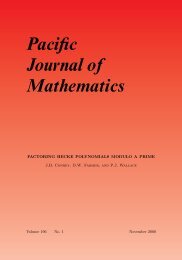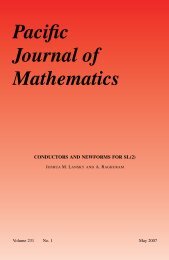Compatible Peirce decompositions of Jordan triple systems - MSP
Compatible Peirce decompositions of Jordan triple systems - MSP
Compatible Peirce decompositions of Jordan triple systems - MSP
You also want an ePaper? Increase the reach of your titles
YUMPU automatically turns print PDFs into web optimized ePapers that Google loves.
96 KEVIN MCCRIMMON<br />
usual to simply refer to S itself as a structural transformation.)<br />
The inner structural S are those in the subspace Instrl (J, M) =<br />
L(M, J) + L(J, M) (note by (0.4)L(#, m)* = L(m, a?)), the inner derivations<br />
are Inder (J, M) = Instrl (J, M) Π Der (J, ilf). This includes<br />
all sums <strong>of</strong> standard inner derivations D(x, m) = L{x, m) — L(m, x),<br />
and coincides with these if 1/2 eΦ.<br />
Even for unital <strong>Jordan</strong> algebras, the derivations from a direct<br />
sum are not simply the sums <strong>of</strong> derivations defined on the individual<br />
pieces: the derivations on the pieces can be glued together to form<br />
a global derivation only if they are suitably orthogonal.<br />
PROPOSITION 7.3. A linear transformation S: J —> M <strong>of</strong> a <strong>Jordan</strong><br />
<strong>triple</strong> J = J ι EB EB J n into a bimodule M is structural iff it has<br />
the form S — S x φ 0 S n for S*: J* —> ikf satisfying the following<br />
relations (for x if y u z t eJ* with i, j, kΦ):<br />
(i ) each Si is structural: Si e Strl (J i9 M)<br />
(ii) P{x i)Sny 5)<br />
(iii) {XiSf( Vj)z k}<br />
(iv) {x tSϊ(y t)z k} - {x ty tS k(z h)}<br />
S is a derivation iff each Si is a derivation, S? = — S M are precisely the S =<br />
for Sii Ji-+ M. The structural condition (7.1) for all x, y eJ reduces<br />
to the following conditions on the spanning elements x if y if z { e J ύ:<br />
(7.1a) Smxjyj) + P(Xi)Sf(y ά) = {x.<br />
(7.1b) ^({^7/^}) + {XiSf( yj)z k} = {xMjSM} +<br />
for all i, j, Jc with %Φk. Condition (7.1a) for j = i is the condition<br />
(i) that Si be structural on J> for j Φ i, by orthogonality J* l J^<br />
the condition (7.1a) reduces to (ii). Similarly, by orthogonality (7.1b)<br />
reduces to (iii) if j Φ i,k and to (iv) if j = i. •<br />
To see that the requisite orthogonality is not automatic, consider<br />
the following<br />
EXAMPLE 7.4. Let J = Φz ffl Φw be a trivial <strong>Jordan</strong> <strong>triple</strong><br />
system and M = Φm 0 Φ^ the bimodule determined by p(z) =<br />
/o(«, w) = Z(β, 2) = l(w, w) = i(w, 2) = 0, ί(z, w)m = n, l(z, w)n = 0.<br />
Here the split null extension J=JφM may be imbedded in M 4 (Φ) +<br />
via z -»£ 12 , w ~> β 23 , m -> e 3i , n —> β u . Then {zwM} = Φn Φ 0, so {Ji/yM"}<br />
is not necessarily 0 in a direct sum J = Ji EB EB J n.<br />
Thus orthogonality <strong>of</strong> Ji, J^ in J does not imply orthogonality


